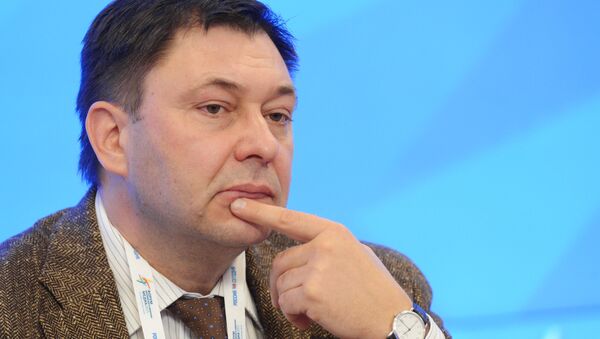Sputnik: After 100 days in confinement what is known about Vyshinsky and the prospects of him being release?
Tiberio Graziani: After more than three months in prison, we know little about the fate of journalist Kiril Vyshinsky and very little about his release. This is due, in my opinion, to at least two main reasons. The first one is due to the probable underground diplomatic work that the Kremlin is pursuing also internationally, trying to involve the UN as well. The second reason is related to a sort of press silence that the main Western mass media maintain on this case.
READ MORE: #TruthNotTreason: Kirill Vyshinsky's 100 Days Behind Bars in Ukraine
Tiberio Graziani: The arrest of Vyshynsky is part of the tensions between Kiev and Moscow, as known, starting from the so-called Orange Revolution of 2004 and exploded in 2014. In […] reality, more properly and in a historical perspective, the tension between Kiev and Moscow is an episode of the US-led Western system attempt to expand its influence within the Eurasian continental mass. This involves a geopolitical, geoeconomic and geostrategic practice whose main target is Russia.
Sputnik: Previously many experts noted that he was being held as Kiev was trying to apply pressure on Moscow ahead of the FIFA World Cup. Do you think this is still the case?
Tiberio Graziani: Most likely, Mr. Vyshinsky case is now being used as pressure on Moscow in the various international meetings that President Putin has with European politicians.
READ MORE: Rally in Support of Kirill Vyshinsky in Front of Ukrainian Embassy in Moscow
Sputnik: What is your take on the way this issue has been addressed by Western media and journalists?
Tiberio Graziani: Regarding the Vyshinsky case, the Western mass media have practiced a double standard. Evidently, the Western mass media do not consider Vishynsky a journalist worthy of their consideration. This shows that, paradoxically, precisely in the age of communication,
there is a great global crisis of freedom of expression.
What other measures could have been taken and can still be taken to speed up the process of his release? I think that the diplomatic negotiations should be continued.
The views and opinions expressed in this article are those of the speaker and do not necessarily reflect Sputnik's opini9on.


